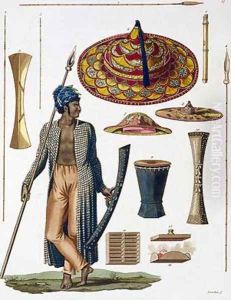Landini Paintings
Francesco Landini, also known as Francesco da Firenze or Francesco degli Organi, was a prominent Italian composer, organist, singer, poet, and instrument maker from the late Middle Ages. Born around 1325 in Florence, Italy, he became one of the most celebrated musicians of his time. Despite being blinded by smallpox in childhood, Landini's musical talents were apparent from an early age, and he became renowned for his skill as an organist and his innovative compositions.
Landini's career flourished in the cultural hub of Florence, where he was associated with the city's Santa Trinita convent and served at the Church of San Lorenzo. His reputation extended beyond Florence, and he was known across Italy and even in parts of Europe. A testament to his fame was his inclusion as a character in Giovanni Boccaccio's 'Decameron,' which implies his celebrity status during his lifetime.
He was an integral figure in the development of Italian secular music, especially the form known as the ballata, of which he wrote over 140 pieces. Landini's style was characterized by melodic sweetness and a refined, courtly manner that made his music highly popular. In addition to ballate, he wrote madrigals and caccias, though his sacred music has not survived, if indeed he composed any. His work was compiled in the Squarcialupi Codex, one of the most important sources of Italian medieval music.
Landini's influence on the musical landscape of his time was significant, and he was a central figure in the so-called 'Ars Nova' period in Italy, which saw the development of new musical techniques and notations. His death in 1397 marked the end of an era, and he was mourned by poets and musicians alike. Today, Landini is remembered as a key figure in medieval music and his works continue to be performed and recorded, offering a window into the rich artistic atmosphere of 14th-century Italy.


